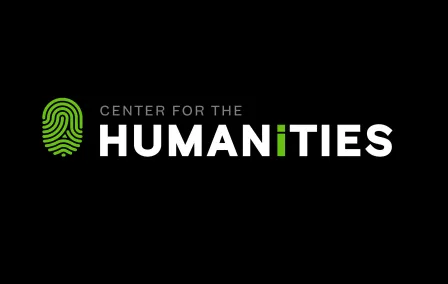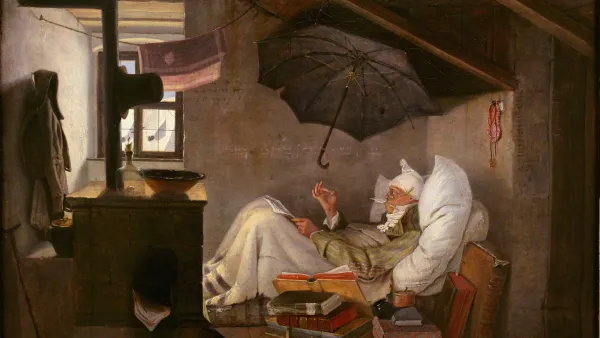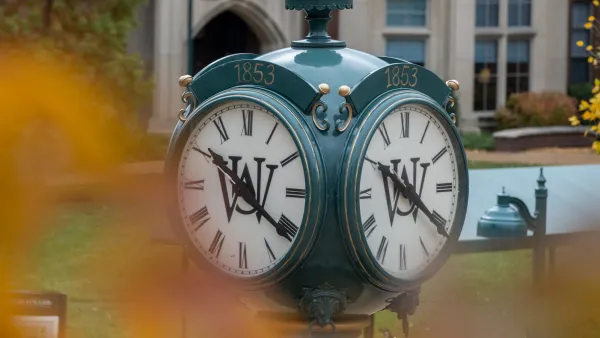The Center for the Humanities’ reading and writing groups provide a forum for pursing specialty interests and connecting likeminded scholars.

Reading and Writing Groups
The Center for the Humanities is accepting proposals from Washington University faculty and graduate students in the humanities and humanistic social sciences for reading and writing groups during the 2024–25 academic year. Groups are self-organized by the participants, have an ongoing core membership and meet regularly throughout the academic year.
Deadline: Friday, February 23, 2024
It is one of the peculiarities of working in humanities fields as graduate students that we spend lots of time working in solitude, occupied with reading and writing, mostly alone, only sometimes interrupted by classes or conferences. But when the time of coursework has passed, if you don’t watch out, there’s the possibility of finding yourself in a hermit’s cave, leading a hermit's life in a cold apartment, doomscrolling endlessly and thinking about getting 16 cats. I’ve observed that this solitary research life can extend far into the profession.
Maybe it comes as no surprise that in 2023, three years after the pandemic and social distancing began, that the number of reading and writing groups funded by the Center for the Humanities has increased to 26 from 20. The broad thematic range of these groups is astonishing. The scope ranges from RTTP (Reacting to the Past) Game Writing to Digital Humanities, from History of the Present to Medieval Writing, from Sport and Society to Comparative Readings of LGBTQ+ Literature in German, to name only a few.
There are also groups that deal with the future of work in general (Anti-Work and Degrowth), but also very particularly with challenges scholars in the humanities must deal with in their career paths (the Washington University Translation Collective).
What all groups have in common is their approach to areas that aren’t addressed, or only partly addressed, by the official syllabi. When and where would be a better moment to really spend time and thought on Finnegans Wake than in a reading group?
But even more important than finding time and space for neglected topics is finding community. The humanities center hosted an event with that in mind in early November. As everybody knows, November 1 marks the thin line between the horrors of Halloween and the horrors of the month of November and all that follows (end of the semester, seasonal depression). That time of year seemed to be the right moment to bring together the graduate student members of our reading and writing groups and to treat them to some drinks, pizza and a little bit of human interaction.
Some of the members already knew each other, either from previous courses or because they are members of multiple groups. Others were new to the party, having started a reading or writing group on their own for the sole purpose of following their interests and being willing to share it with others.
What I love about the reading group: It keeps my intellectual life vibrant, and it pushes me in unexpected directions.
— Alex Mouw
But in terms of the workload that comes with graduate school and writing a dissertation, why would anyone spend the time to organize a reading group?
“We noticed that authors like György Lukács, Jürgen Habermas and Antonio Gramsci were routinely referenced in essays and books that we were reading for our seminars, but we would rarely get to engage with these authors on their own terms,” says Marc Blanc, convener of the Marxist reading group with Sophie Levin, both graduate students in the Department of English. “Sophie and I started reading them and discussing amongst ourselves, but we quickly decided that we wanted to invite more minds into these discussions. Our group exists to create opportunities for students to collectively dive deeply into these texts — and a deep, focused and collective dive is what many of these texts demand of the reader.”
It seems the case that not only in this group, but also in others, the readings one comes across in courses or in preparation for a dissertation, lead to a deeper engagement with adjacent authors or topics. And deeper engagement means to really have the time and space to dive into different literary works.
“We’ve covered a wide array of specific poets: John Donne, Muriel Rukeyser, Phillis Wheatley, Alfred Lord Tennyson,” says Ann Marie Jakubowski, convener of the Poetry and Poetics Reading Group she leads with fellow English department PhD student Alex Mouw. “One of my favorite things about the group is how it prompts us to take a sustained look at topics we might otherwise glance past. For example, we spent an entire semester on James Merrill’s long poem The Book of Ephraim, and it was definitely the case that the more time you spend with it, the more layers of understanding you can tease out.”
Mouw adds: “One unexpected gift of the reading group is that we learn so much whose value we couldn’t calculate in advance! I was glad to read Tennyson’s ‘In Memoriam A.H.H.’ this semester, but I never guessed that I would cite it in the chapter I’m currently writing. It’s just a passing reference, but still, it illustrates what I love about the reading group: It keeps my intellectual life vibrant, and it pushes me in unexpected directions.”
Keeping one’s intellectual life vibrant seems reason enough to stay engaged with a reading group, but when the selected texts find their way into dissertations, or projects apart from graduate school, these meetings even help building paths into a future.
“As graduate students, we encounter knowledge mostly as students, researchers and instructors, and this group allows us to explore new identities such as creative writers,” says Yihan Lu Wang (Chinese & Comparative Literature), convener of the RTTP Game Writing Group. “It is also a space to think about our relationship with teaching and learning through more participatory forms. It is fascinating for me to bring people into this viewpoint. The experience of sharing this perspective creates an imagined community for future interactions I could have both inside and outside classrooms.”
Sharing perspectives on beloved common-interest topics and building an “intellectual camaraderie,” as Marc Blanc describes it, are the social benefits that come from these groups. “Over three years, the group has built a space where we can talk casually, candidly and rigorously about the ideas and arguments in our texts. While some parts of graduate school feel like labor, the Marxism and Literature group does not. I always leave a meeting feeling refreshed, intellectually inspired and supported.”
While some parts of graduate school feel like labor, the Marxism and Literature group does not. I always leave a meeting feeling refreshed, intellectually inspired and supported.
— Marc Blanc
The work as a scholar in the humanities can feel lonely sometimes. There’s a great gain in finding people who are as thrilled as you are to talk about Christina Rossetti’s “Goblin Market.” I went to a meeting of the Poetry and Poetics Reading Group where they discussed that work, and it felt like something outside of space and time. (But perhaps that was also due to the goblins’ strangely compelling art of seduction.) This community is not only about having these people around you for the duration of grad school, but also later, when prospective career paths might cross again, offering you the chance to work on new projects together once more.
Even if this prospective project consists of helping you turn your 16 cats into social media stars.
Stephanie Nebenfuehr is a PhD student in the Program in Comparative Literature’s International Writers Track. In fall 2023, she completed a mentored professional experience (MPE) with the Center for the Humanities.
Headline image: Der arme Poet (The Poor Poet, 1839) by Carl Spitzweg. Public domain.




